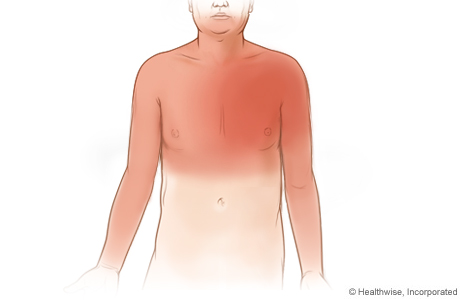Patient Resources
Our Health Library information does not replace the advice of a doctor. Please be advised that this information is made available to assist our patients to learn more about their health. Our providers may not see and/or treat all topics found herein.
Topic Contents
Angina
Condition Basics
What is angina?
Angina is a symptom that happens when your heart muscle does not get enough blood and oxygen. For most people, it feels like chest pain or pressure. Some other symptoms include shortness of breath and pain or pressure in the back, neck, jaw, or upper belly or in one or both shoulders or arms.
What causes it?
Angina happens when the heart muscle doesn't get enough oxygen. This most often happens because of a shortage of blood and oxygen to the heart muscle. This low blood flow is often a result of narrowed blood vessels. The narrowing may be due to a buildup of plaque caused by hardening of the arteries (atherosclerosis). The narrowing can also happen when a coronary artery suddenly contracts (spasms).
If you have stable angina, you can usually predict when your symptoms will happen. For example, symptoms may happen with activity or stress. You may also feel symptoms when you are exposed to the cold or you are smoking.
With unstable angina or a heart attack, symptoms are different from your typical pattern of stable angina. For example, you may have symptoms at rest. This happens when narrowed vessels or blood clots in the coronary arteries suddenly slow blood flow to the heart muscle.
What are the symptoms?

Most people feel angina symptoms in the chest. The most common symptom is chest pain or pressure, or a strange feeling in the chest. But you might feel symptoms in other parts of your body. Some people feel pain, pressure, or a strange feeling in the back, neck, jaw, or upper belly, or in one or both shoulders or arms.
Other symptoms of angina include shortness of breath, nausea or vomiting, lightheadedness or sudden weakness, or a fast or irregular heartbeat.
How is angina treated?
Angina symptoms can be relieved with different types of medicine.
You may take a quick-acting form of nitroglycerin to prevent or relieve angina when it happens.
You might also take a daily angina medicine. This type of medicine can prevent angina that occurs during daily activities. It is not used to stop sudden symptoms of angina. Most people take this medicine every day. These medicines include nitrates (including nitroglycerin), beta-blockers, and calcium channel blockers.
How can you manage angina?
To manage angina, pay attention to your symptoms so you can see what causes them and what is typical for you. You may use medicine and change activities to prevent and relieve symptoms. Watch for changes in your symptoms. And know when to call your doctor or get help right away.
Related Information
Credits
Current as of: October 2, 2025
Author: Ignite Healthwise, LLC Staff
Clinical Review Board
All Ignite Healthwise, LLC education is reviewed by a team that includes physicians, nurses, advanced practitioners, registered dieticians, and other healthcare professionals.
Current as of: October 2, 2025
Author: Ignite Healthwise, LLC Staff
Clinical Review Board
All Ignite Healthwise, LLC education is reviewed by a team that includes physicians, nurses, advanced practitioners, registered dieticians, and other healthcare professionals.
This information does not replace the advice of a doctor. Ignite Healthwise, LLC disclaims any warranty or liability for your use of this information. Your use of this information means that you agree to the Terms of Use and Privacy Policy. Learn how we develop our content.
To learn more about Ignite Healthwise, LLC, visit webmdignite.com.
© 2024-2025 Ignite Healthwise, LLC.


